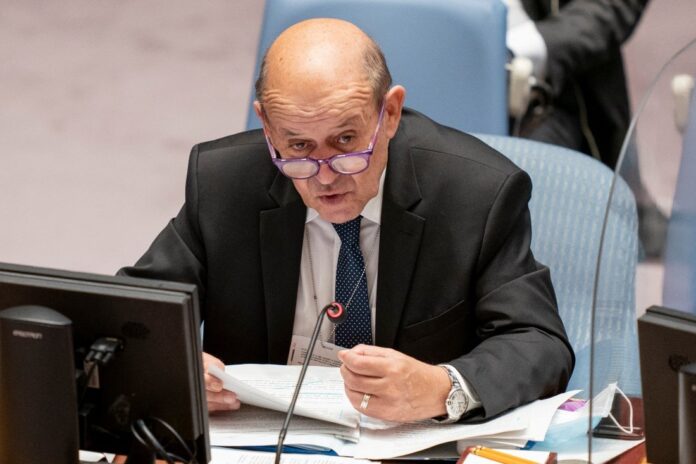PARIS: Two European ministerial visits made the headlines in the Saudi capital last week. Meetings with French Minister for Foreign Affairs Jean-Yves Le Drian and High Representative of the European Union for Foreign Affairs Josep Borrell underline the growing European interest in consultations with Saudi Arabia, which is a key player. However, from Riyadh’s point of view, it is the European and French acts on several regional issues which give credibility to these European initiatives.
Constructive Franco-Saudi exchange
Jean-Yves Le Drian was received by Crown Prince Mohammed bin Salman. He also met his Saudi counterpart and the Kingdom’s Culture and Energy ministers.
French sources said the visit helped to deepen relations in the cultural, environmental and economic fields, particularly in the digital, transport and green energy sectors.
The talks covered the major regional crises. The French minister reaffirmed France’s commitment to stability and security in the region, recalling the dynamic of regional dialogue initiated by the Baghdad conference at the end of August. On the war in Yemen and Gulf security, Paris reiterated its support for the Saudi initiative for the cessation of hostilities and the continuation of Saudi-Iranian dialogue. On the Iranian nuclear issue, the two sides agreed on the need for an arrangement that guarantees Iran’s non-access to nuclear weapons.
The French minister pointed out the obstacles that complicate the relaunch of the Vienna process and put forward the European point of view, which considers the return to the joint action plan (JCPOA) of 2015 to be the only way to block the scenario of a nuclear Iranian state or “nuclear threshold state.”
Riyadh reminded its visitor of the importance of dealing with matters closely linked to the nuclear issue, such as ballistic missiles and Iranian interference at the regional level.
The critical Lebanese issue
Lebanon has been on the agenda of all recent meetings between Paris and Riyadh.
Despite the French minister’s denial of any Franco-Iranian bilateral deal concerning Lebanon, Riyadh remains unconvinced by the new formation of power in Beirut and its ability to liberate Lebanon from the Iranian grip embodied by Hezbollah. The Saudi leadership reportedly informed Le Drian that “the government formed and lead by Mikati has maintained this supremacy instead of softening it.”
Le Drian therefore returned to Paris disappointed in this regard.
In response to Paris’ desire for Riyadh to regain its traditional role of donor to a drained Lebanon, Saudi Arabia pointed out that it has been providing aid for a long time. It said that in recent years primarily the dominant role of Hezbollah had been responsible for the multidimensional crisis. Moreover, the involvement of a party that relies on the Iranian Revolutionary Guards in the transport of fighters, arms, advisers and equipment from Syria to Yemen clearly harms the strategic security of the Kingdom, as well as that of other Arab countries.
Paris may be betting on the new Lebanese Prime Minister, Najib Mikati, but an Arab source in Cairo understands that Riyadh does not share this view and doubts the potential performance of this Prime Minister, who seems “hesitant and ineffective.”
New European orientation
The EU’s High Representative for Foreign Affairs and Security Policy, Josep Borrell, visited Saudi Arabia as part of a tour of the Gulf states. He was looking to gain support and strengthen strategic cooperation between Europe and the Arabian Peninsula on issues such as the crisis in Afghanistan.
This is the first time that Borrell has toured the Gulf since taking office in 2019. The interest of Brussels in this region derives in particular from the reforms undertaken in countries such as Saudi Arabia with its Vision 2030. Besides its political and strategic interest, this opening could offer a great economic opportunity to Europe. European investments in the Gulf offer benefits for both sides in an uncertain economic context still undermined by the pandemic.
During his talks in Riyadh with his Saudi counterparts, the Spanish diplomat said that geopolitical cooperation was one of the EU’s priorities. Brussels is looking to develop its foreign policy by building alliances with reliable partners. The EU is placing emphasis on the importance of ties with the Arab Gulf states after Washington shifted its foreign policy focus to the Indo-Pacific. Discussing his visit, Borrell said that “the meetings in Riyadh were essential because Saudi Arabia is an important player on the global and multilateral stage.”
More generally, the EU intended to relaunch its cooperation with the GCC so that clear commitments can be made at the conference of signatory countries of the United Nations Framework Convention on Climate Change (COP26) in Glasgow in November.

